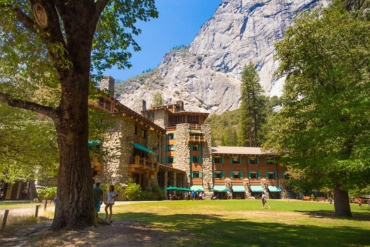Made public this week, a 2017-18 report contracted by the National Park Service catalogs widespread sexual harassment and discrimination within the agency. What’s more, new information shows that many park service employees believe the NPS tried to ‘bury’ the report.
Sepler & Associates, a nationwide human resources consultant, compiled the National Park Service Voices report at the NPS’s behest from December 2017 to April 2018. It sourced up to 1,200 employees, comprising 53 in-person interviews, 27 web sessions, and over 200 anonymous submissions to an online portal. According to leaked emails, Sepler & Associates invited every NPS employee to participate.
The agency commissioned the report on the heels of a 2017 survey that showed almost 40% of employees had experienced harassment or discrimination at work within the last 12 months.
In fact, harmful workplace conditions appeared to have pervaded the agency for decades before that. In 1999, the NPS conducted an internal investigation into harassment against women, but the resulting report produced no substantive changes.
Public Employees for Environmental Responsibility (PEER) made NPS Voices public on Nov. 15. It not only cites ongoing disenfranchisement within the NPS, but it also sheds light on the fact that many employees believe the agency actively represses those who have been abused.
Employees point to a nonfunctioning system for reporting and investigating complaints, instances of retaliation against those who speak out, and failures by leadership to hold alleged harassers accountable (pages 9-10).
High Country News (HCN) reported that one female employee, who ultimately left the agency after a male coworker sexually assaulted her but avoided punishment, said, “it felt like leaving a cult.”
View this post on Instagram
NPS Responds as Employees Speak of Being ‘Treated Like Dirt’
PEER’s disclosure begs the question: Why did the report go public now, via leak, instead of at the NPS’s disclosure when it received it? Responding to HCN, NPS Chief Spokesperson Jenny Anzelmo-Sarles underscored the agency’s inclusivity messaging with a familiar excuse.
According to Anzelmo-Sarles, the NPS is “committed to eradicating harassment in the workplace.” She also claimed COVID-19 stopped the agency from distributing the Voices report to its employees.
“We recognize our delay in sharing the report could have the unintentional consequence of impacting our efforts to build confidence and trust with employees,” Anzelmo-Sarles said.
Anzelmo-Sarles said the agency received the final report in late 2019. Comments in its “Storybook” section are often scalding.
“My advice is that you tell people exactly what will happen if they report harassment,” one employee, speaking anonymously, warned. “Don’t sugarcoat it. Tell them the truth. Tell them that managers and supervisors will circle the wagons and protect each other. Tell them that EEO [equal employment opportunity] counselors and Employee Relations Specialists and everyone else will treat them like dirt.”
Other reported incidents display victim-blaming and gaslighting.
“Management allowed the harassing individual in my case to write the summary of the investigation into his own wrongdoing,” one employee said. “Yes, that is correct. The harassing individual was allowed to determine if they were responsible for their own wrongdoing. Further, management refused evidence and witness statements that supported my claims during the investigation. Management also refused to acknowledge there was wrongdoing and claimed that I was the problem for raising the concerns of wrongdoing.”
Failed Attempts at Accountability for Discrimination, Harassment
The report substantiates discrimination within the agency on the basis of race, gender, sexuality, age, and religion (see page 11), as do HCN’s sources. The NPS last updated its sexual harassment policy in April 2018, when the live sessions for the Voices report concluded. That document, according to respondents, again generated no meaningful change.
Dissonantly, the agency’s higher-ups appeared to consider it instrumental. In a comment that also pointed to the agency’s awareness of its culpability, then-associate director of workforce and inclusion Nhien Tony Nguyen said the policy update would “serve as a cornerstone in our efforts to change the culture that has allowed harassment to persist.”
Not surprisingly, the Voices report also revealed a “strong, consistent” agreement among NPS employees that HR systems are not working (page 9).
Despite the criticism, the NPS reiterated what it saw as steady progress.
“We continue to encourage people to talk openly and honestly about workplace concerns and NPS leadership remains committed to being open and transparent,” Anzelmo-Sarles said.
View this post on Instagram
And she did provide one encouraging statistic: a 10% increase from 2019-20 in employees “reporting they have confidence that the NPS will take immediate action to stop inappropriate behavior and hold offenders accountable.”
‘The People Who Cause the Harm’
According to one individual with knowledge of the report, however, some systemic blockage is choking out the possibility of real change in NPS policy.
There is “no doubt the report was put in front of people who had capacity to do something about it,” the anonymous source said. “There is a dedicated group of career professionals in NPS that understand what needs to be done — they have the skill, capacity, and heart — but they rely on leadership to empower them to address this, and for some reason that has stalled.”
View this post on Instagram
For now, the NPS will face the fallout from the Voices report. To that end, PEER shared the report with incoming Park Service Director Charles Sams, along with a note that “changing the dynamics at the NPS will require removing leaders who have perpetuated this toxic culture, many of whom had a hand in burying this report.”
One anonymously sourced employee put the problem simply to HCN, saying, “The people who cause the harm are often the ones asked to put the solutions in effect.”







